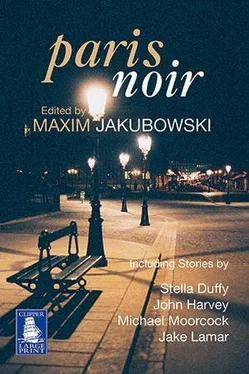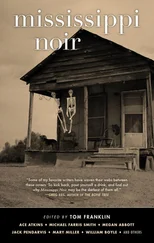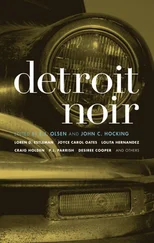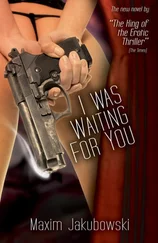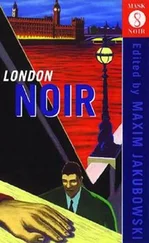Maxim Jakubowski - Paris Noir
Здесь есть возможность читать онлайн «Maxim Jakubowski - Paris Noir» весь текст электронной книги совершенно бесплатно (целиком полную версию без сокращений). В некоторых случаях можно слушать аудио, скачать через торрент в формате fb2 и присутствует краткое содержание. Жанр: Детектив, на английском языке. Описание произведения, (предисловие) а так же отзывы посетителей доступны на портале библиотеки ЛибКат.
- Название:Paris Noir
- Автор:
- Жанр:
- Год:неизвестен
- ISBN:нет данных
- Рейтинг книги:3 / 5. Голосов: 1
-
Избранное:Добавить в избранное
- Отзывы:
-
Ваша оценка:
- 60
- 1
- 2
- 3
- 4
- 5
Paris Noir: краткое содержание, описание и аннотация
Предлагаем к чтению аннотацию, описание, краткое содержание или предисловие (зависит от того, что написал сам автор книги «Paris Noir»). Если вы не нашли необходимую информацию о книге — напишите в комментариях, мы постараемся отыскать её.
Edited by Maxim Jakubowski, the stories range from quietly menacing to spectacularly violent, and include contributions from some of the most famous crime writers from both sides of the Atlantic, as well as the other side of the Channel.
Paris Noir — читать онлайн бесплатно полную книгу (весь текст) целиком
Ниже представлен текст книги, разбитый по страницам. Система сохранения места последней прочитанной страницы, позволяет с удобством читать онлайн бесплатно книгу «Paris Noir», без необходимости каждый раз заново искать на чём Вы остановились. Поставьте закладку, и сможете в любой момент перейти на страницу, на которой закончили чтение.
Интервал:
Закладка:
Julie shuddered in disgust, thinking her friend a bit twisted for revelling in such macabre details. It was as if, from fantasising about this series of sexual murders, she’d begun to imagine herself as one of the victims, and got a kick out of it. ‘You’re right, I’m a real perv,’ Claire laughed.
‘Well anyway,’ Julie interrupted her, ‘it’s finally over… We can breathe…’
Through the bay window, she watched the light play on the buds of the trees on boulevard Louis Pasteur. It was a beautiful spring afternoon. This weekend, she’d go for a walk in the Bois de Boulogne, or the Luxembourg Gardens, or treat herself to a movie with Claire…
‘Don’t you believe it, darling!’ The medical student’s tone turned menacing. ‘Nothing’s over till he’s arrested! Right now the cops only have his name and his photo… And even if they catch him and he gets life without remission, he’ll be out after twenty years, you’ll see, if he doesn’t escape earlier! And then, when he’s out, he’ll start again. I’ve really studied his case: this ‘Guy Georges’, since now we know his name, is incurable. He’s not a madman, more an intelligent thug. He looks normal, maybe even likeable, it’s just he can’t resist, it’s in his past or his genes, he has to kill. Once a month if possible. He’s dodged the police so often he thinks he’s invincible. And at those moments, the wretched girl in front of him, tied up, weak and terrified, is just an object, not a human being. An object of rape and then murder.’
‘Claire, please stop…’
The intern chuckled. ‘OK, I’m stopping, you poor thing. But nothing’s over, you’ll see. He knows he’s a marked man, he could get even more dangerous, take a girl hostage, I don’t know… So you still have to be extra careful going home tonight, OK?’
Julie rolled her eyes and pulled a face.
‘All right, all right. And if I’m too scared when I come out of the station, I’ll call you to come and escort me to rue Cels, OK?’
The two friends burst out laughing, blew each other kisses down the phone and ended the call at the same time.
The afternoon went by like a dream. Concentrating on the Mac screen, on her photos, titles and fonts, and files to be sent to the printer, Julie wasn’t aware of time passing. It was the end of March, the days were growing longer, but eventually the light faded… At 7 p.m., Gilles stood up, put on his raincoat and waved goodbye to his assistant. ‘Right, see you tomorrow, Julie. I’ll leave you to finish off the cover. Send it to Magnus, wait for his approval, then you can go home.’
‘But…’
‘Don’t worry, you’ll be fine. See you then, bye!’
Magnus Laksson, a Finn who’d settled in the US, supervised the art direction for all the international editions. His trenchant opinions, utter lack of diplomacy, and ultra-conservative view of what Reader’s Digest should be in America and elsewhere, made him the bête noire of art directors working under him. Julie sent him the mockup of the cover accompanied by a few polite phrases in her approximate English and waited for the verdict, which, with the time difference (Laksson had no doubt gone for lunch), only arrived on her screen at 10.30 p.m., French time.
The Finn hated the cover.
The response, in two laconic, brutal sentences, reminded Gilles and Julie that the cover should never allude visually to the issue’s central theme but must be kept to some neutral and soothing image – and demanded a new one before the end of the day.
Julie didn’t dare disturb Gilles at home so, valiant Breton that she was, she laboured over a new version of the cover which took until twenty-five past midnight, sent it to the US and shut down her computer. If she stayed to wait for the American reaction, she’d miss the last train home from Bagneux. And she didn’t have enough money on her for a taxi to Montparnasse at the night rate, which was at least sixty francs. Julie ran down the empty corridors, her coat under her arm, to the foyer where the North African night watchman, deep in a sports paper, nodded at her vaguely. She raced down the front steps and set off across a deserted Bagneux, in the glow of the streetlights, into an icy wind she hadn’t expected. Anticipating going home much earlier, Julie had even put on a miniskirt today, something she hadn’t dared do in four months, terrified by the possibility of a nocturnal encounter with the Ripper. But the morning news had reassured her on that score…
Her heels clicked on the tarmac, she ran through the labyrinth of narrow streets, lined with peaceful small pensioners’ houses, as far as the main road which she crossed, defying the red pedestrian signal, between two cars hurtling at well over 50 miles an hour which honked warnings at her. The train indicator board in the empty station showed the Paris train was at the platform.
‘Oh no,’ Julie groaned, inserting her season ticket into the machine.
The ‘doors closing’ signal sounded as she reached the platform. She ran as if her life depended on it, leapt between the sliding doors, forcing her way through, and she was inside, panicky and breathless, frantically tugging at the handle of her bag which was wedged between the strips of rubber, as the train pulled away.
The few passengers in the compartment stared at her briefly before falling back into the apathy of exhausted workers or depressed night owls. She flopped onto a seat, her heart thudding, and watched vaguely as the suburban lights and bare station platforms slipped past. Ravenous (she hadn’t eaten since midday), sleepy, her head nodding, she nearly dozed off and missed her stop. Denfert-Rochereau. She jumped up and just made it through the hissing doors.
Because she’d got on at the end of the train, Julie, walking along the platform towards the exit, came first to the narrow staircase that led directly to the square, in the former railway station converted to a regional express station. Which would mean having to cross the vast Denfert-Rochereau traffic intersection in the wind and cold… Julie opted for the next exit, which connected to the Métro, lines 4 and 6, and would bring her out of the station as close to her home as possible, with only rue Froiaevaux to walk up to rue Cels.
In the bowels of the empty station, she used her ticket again to exit the row of ticket barriers and turned, following signs to the Porte d’Orléans line. It was a complicated network of corridors but the young provincial woman was becoming familiar with it. At the next intersection she had to turn left, then sharp right towards the escalator. It was in this last corridor that she saw him.
Julie considered herself good at remembering faces, and she’d studied the photofit of the ‘east Paris killer’ in the media many times. The only difference was that the man had grown a thin moustache. Everything else matched the description given by the survivor. In his thirties, tall, athletic-looking, lithe, the dark skin of a North African. Closely cropped hair, practically shaved. Their eyes met just as he drew level with her. For that fraction of a second, Julie detected the glimmer of interest in the man’s eyes, saw the quick, sidelong glance at her slender legs below her miniskirt. She hurried on, short of breath, looking down, her expression as neutral as possible. Her heart was pounding wildly. What an appalling coincidence, what terrifying bad luck… Just as long as he didn’t turn round now and follow her! Julie didn’t dare look over her shoulder. She let her shaky body be carried by the escalator, praying she’d find an RATP employee still at the ticket window. It was almost one in the morning. The last trains had probably all left. She pushed the heavy glass door and saw with annoyance that the ticket office was closed, the blind was down, the lights out. Now she only had to walk up the last flight of steps to the square, where the wind was gusting hard and clouds scudded across the sky, revealing glimpses of a perfectly round, wan moon. It illuminated the powerful musculature of the Denfert Lion, which watched over the middle of the square in bronze impassivity.
Читать дальшеИнтервал:
Закладка:
Похожие книги на «Paris Noir»
Представляем Вашему вниманию похожие книги на «Paris Noir» списком для выбора. Мы отобрали схожую по названию и смыслу литературу в надежде предоставить читателям больше вариантов отыскать новые, интересные, ещё непрочитанные произведения.
Обсуждение, отзывы о книге «Paris Noir» и просто собственные мнения читателей. Оставьте ваши комментарии, напишите, что Вы думаете о произведении, его смысле или главных героях. Укажите что конкретно понравилось, а что нет, и почему Вы так считаете.
